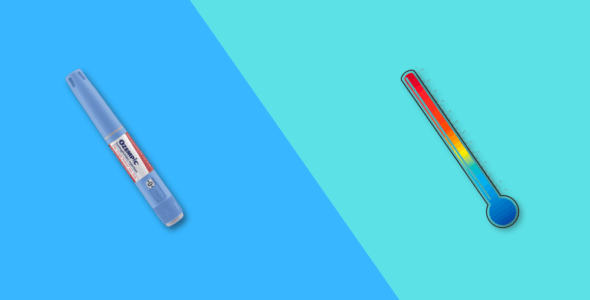Does Ozempic make you feel tired?
Key highlights
- Some users report tiredness or fatigue while using Ozempic, although tiredness is rare and not listed by the manufacturer as one of the common side effects.
- The most common side effects are nausea, vomiting, diarrhea, stomach pain and constipation. However, these side effects typically subside as your body gets used to Ozempic.
- Lower blood sugar levels can contribute to tiredness.
- Improving sleep, physical activity, eating a healthy diet, and mental health can help decrease fatigue.
- If the tiredness persists or any other severe side effects occur, consult with a healthcare provider.
Ozempic (semaglutide) is a glucagon-like peptide-1 (GLP-1) receptor agonist, primarily prescribed to improve blood sugar levels in adults with type 2 diabetes mellitus and reduce the risks of heart disease. While not approved for chronic weight management, Ozempic is known to be an effective weight loss drug and is commonly prescribed off-label for weight loss.
The most common Ozempic side effects (and for Wegovy, another brand name drug by Novo Nordisk with the same active ingredient, semaglutide) are stomach problems like nausea, vomiting, stomach pain, diarrhea and constipation. However, some people report feeling tired while using Ozempic, although this side effect is rare and typically subsides over time as your body gets used to the medication.
Learn more about the common and serious side effects of Ozempic fatigue, how to manage them, and what you can do to avoid fatigue and increase your energy levels.
Does Ozempic make you feel tired?
Yes, Ozempic can make you feel tired. However, fatigue is a rare side effect of this medication.
Tiredness or fatigue is not listed as one of the common side effects of Ozempic, but a small percentage of patients reported tiredness while using Ozempic. According to a clinical trial study, adverse reactions such as fatigue, tiredness and dizziness were found to occur with a frequency of greater than 0.4% in type 2 diabetes patients. People might experience fatigue within the first few weeks of starting the medication, and the feeling will typically decrease over time as your body gets used to the medication.
While it’s unclear why some people feel tired while others don’t, it’s possibly attributed to how Ozempic works. Ozempic contains the active ingredient semaglutide which mimics the actions of the hormone GLP-1 to regulate blood sugar and curb appetite.
Similarly to other drugs with semaglutide such as Wegovy, Ozempic helps the pancreas to increase the production of insulin if blood sugar is too high and also reduces excess glucose made by the liver. These actions help control blood sugar levels and food intake, increasing your chances of losing weight since you feel fuller.
Lower blood glucose levels can cause people to feel lethargic while their body gets used to the drug. A decreased appetite can also have the same effect. Tiredness can also be caused indirectly by hypoglycemia, which is a potentially serious side effect that involves the lowering of blood sugar, which more likely occurs when the patients take Ozempic together with other diabetes medications like insulin.
Ozempic can make you feel tired but it’s a rare side effect that affects a small percentage of people. Most people who take Ozempic will notice an increase in energy and feel less tired in the long term as weight loss increases and cardiovascular health improves while taking Ozempic in combination with diet and exercise.
Ozempic side effects
While fatigue and drowsiness are not commonly reported side effects of Ozempic, other potential side effects are mostly related to stomach problems as the mechanism of action for Ozempic slows digestion. These side effects are mild and typically resolve or decrease over time as your body gets used to the medication.
The most commonly reported side effects of Ozempic are:
- Nausea
- Vomiting
- Diarrhea
- Stomach pain (abdominal pain)
- Constipation and bloating
These side effects can worsen as your medication dosage is increased and your healthcare provider needs to find the appropriate dosage strength that works for you while balancing side effects and benefits. Gastrointestinal side effects can be uncomfortable for most people and several tools can help:
- Eating smaller meals more frequently
- Taking probiotics
- Eating foods that are easily digestible
- Taking anti-nausea medication such as Zofran (ondansetron) or over-the-counter anti-nausea medications when you feel nauseous
- Avoiding certain foods while taking Ozempic, like fried foods, refined carbohydrates and alcohol
Serious side effects of Ozempic include:
- Pancreatitis: Inflammation of the pancreas
- Changes in the vision: Eyesight alterations
- Hypoglycemia: Low blood sugar, especially when using insulin.
- Kidney problems: Problems with the kidney, such as acute kidney injury
- Gallbladder problems: Possible gallbladder complications such as acute gallbladder disease
- Thyroid C-cell tumors: Tumor risk in the thyroid gland
- Serious allergic reactions: These symptoms include significant skin rash or itching, dizziness or fainting, rapid swelling of your face, lips, tongue, or throat, difficulty in breathing or swallowing, or a rapid and forceful heart pounding.
How to avoid fatigue
There are various lifestyle changes that you can try that can help you manage and prevent tiredness. Lifestyle modifications such as optimum sleep, nutrition, exercise, and mental health can help reduce fatigue and increase energy levels.
Better sleep
Quality sleep is a critical component of your overall health. Not getting enough sleep at night is generally associated with daytime fatigue, daytime sleepiness, poor daytime functioning, and other health problems. Chronic insufficient sleep (also called sleep restriction, which is when an individual routinely sleeps less than what is required for optimal functioning) is associated with morbidity and mortality. Habitual short sleep duration (people who sleep less than 7 hours per day) has also been generally associated with obesity, type 2 diabetes, hypertension, cardiovascular disease, depression and all-cause mortality. The National Sleep Foundation (NHS) recommends 7 to 9 hours of sleep for adults (aged 26-64 years).
A good night’s sleep should be a priority given its influence on these well-known adverse effects. Important sleep hygiene tips include:
- Removing screens (TV, tablets, phone etc.) from the bedroom
- Having a consistent and relaxing bedtime routine.
- Keep the bedroom dark
- Avoid large meals, alcohol and caffeine before going to sleep
By incorporating these practices, you can enhance the quality and duration of your sleep, leading to improved overall health.
Better nutrition
Food is the body’s main source of energy. Deficiencies in essential vitamins and minerals have been associated with fatigue or lethargy. Without food that contains the basic and usable nutrients, the body cannot stay healthy and function.
A varied and balanced diet, rich in nutrient-dense foods such as fruits, vegetables, and dairy products, can provide the necessary vitamins and minerals that your body needs. Other foods that include essential nutrients include lean protein (e.g. eggs, lean meats, and beans), whole grains (e.g. oatmeal and brown rice), and high-quality fats (e.g. nuts, seeds, olive oil, fish). The Mediterranean diet includes these healthy food types and is also associated with improved sleep quality. For people who are precluded from making dietary changes (e.g. due to genuine deficiencies in one or more nutrients), vitamin and mineral supplements may be helpful. However, improving the diet is recommended instead of using supplements because vitamins and minerals are most potent when they come from food so nutritional supplements should only be used as an addition and not as a replacement to a healthy diet.
Equally important to better nutrition is hydration. Dehydration is also responsible for fatigue, confusion, and reduced cognitive function. Ensure that you are drinking enough water, in regular time intervals, so that hydration levels are optimally maintained. Balancing nutrient-rich food and adequate hydration will help boost energy levels and lead a healthy life.
Increased exercise
Studies have shown that getting regular exercise helps with feeling less fatigued. Exercise has also been shown to boost mood and cognitive function which helps to feel more alert during the day.
Cellular-level changes occur in your body when you exercise and cause your body to produce more mitochondria inside your muscle cells. Mitochondria creates fuel out of glucose from the food you eat and oxygen from the air you breathe. Having more of them increases your body’s energy. Exercising also increases oxygen circulation in your body which allows it to function better and use its energy more efficiently. Your body also experiences increased hormone levels when you exercise which also makes you feel more energized and less tired.
Getting regular exercise has also been shown to help boost metabolism, improve mental health, support heart health, and improve quality of sleep.
Improved mental health
Fatigue is a common symptom that accompanies a variety of mental health disorders like depression, burnout, and anxiety. Mental exhaustion can significantly affect your energy levels.
Addressing mental health is important not only for emotional well-being but also for physical well-being. Improving mental health through therapy, self-care, or professional support can lead to increased emotional and physical vitality, helping you feel more energetic and healthy overall.
If you are feeling mentally exhausted, consider stress-relief practices like meditation, mindfulness, and counseling to help with mental exhaustion. Taking proactive steps to support mental wellness can help reduce fatigue and restore overall energy.
When to speak to a healthcare provider
If you are facing persistent tiredness or fatigue, seeking medical advice from your healthcare provider might be useful to help determine the exact cause. Your healthcare provider can guide you on what interventions might best help improve the situation. Your healthcare provider may need to adjust your dosage of Ozempic or refer you for additional tests to rule out other possible serious conditions.
Additionally, if you experience any serious side effects of Ozempic, such as hypoglycemia, yellowing of skin or eyes, swelling, or severe rash, you should seek immediate medical attention.
Bottom line
Ozempic (semaglutide) is an effective treatment for managing type 2 diabetes, but it comes with potential side effects. Although tiredness or fatigue is not typically listed as a common side effect, reduced blood sugar levels can potentially make you feel tired.
Lifestyle changes such as improvements in sleep, a balanced diet, regular exercise, and focusing on mental health can help with reducing fatigue.
If you experience long-term fatigue while using Ozempic or your fatigue is severely affecting your life, speak with your healthcare provider.


















